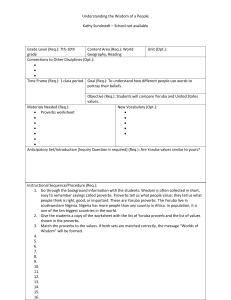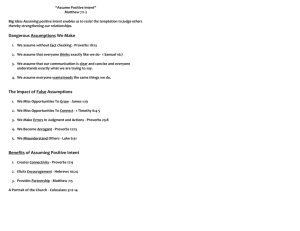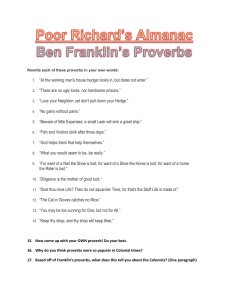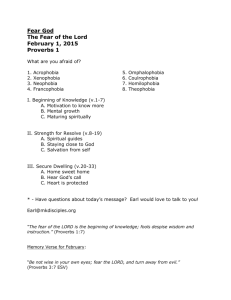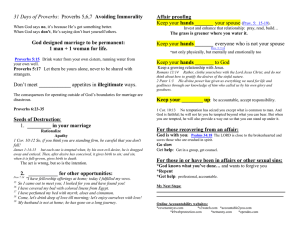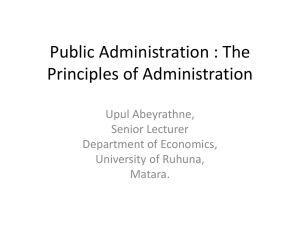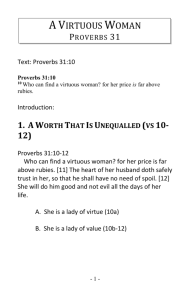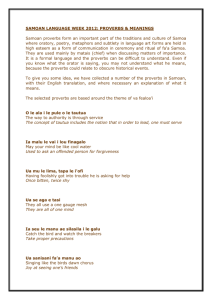Comparing the Wisdom of Places: Nigerian Yoruba Proverbs and Colonial... Benjamin Franklin
advertisement
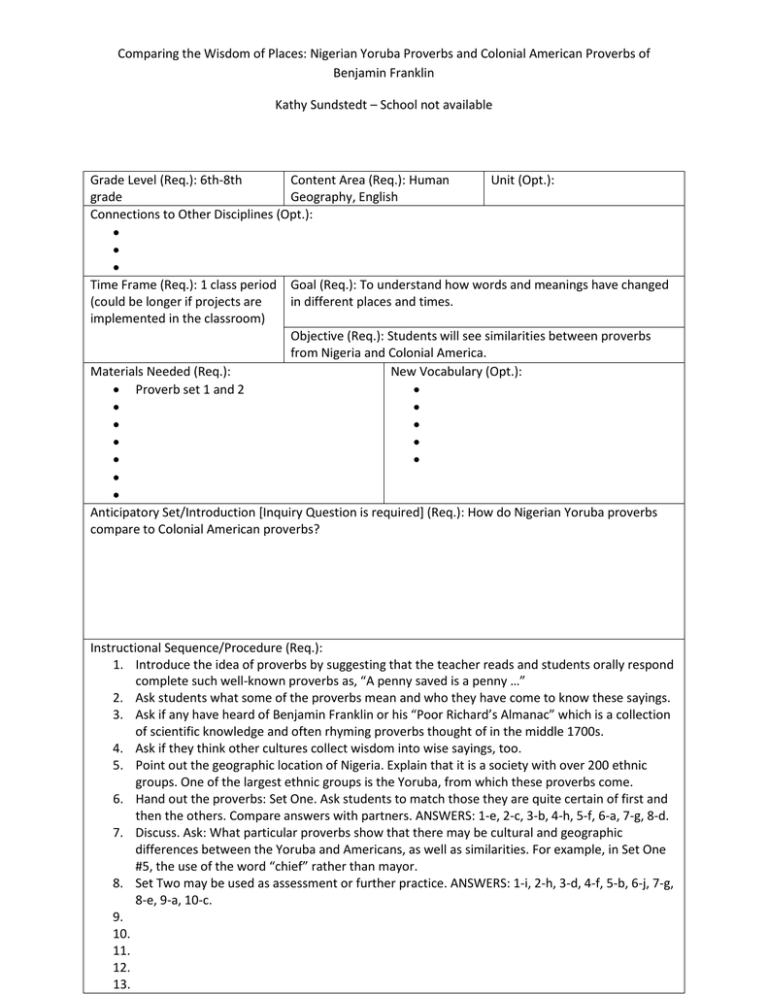
Comparing the Wisdom of Places: Nigerian Yoruba Proverbs and Colonial American Proverbs of Benjamin Franklin Kathy Sundstedt – School not available Grade Level (Req.): 6th-8th Content Area (Req.): Human Unit (Opt.): grade Geography, English Connections to Other Disciplines (Opt.): • • • Time Frame (Req.): 1 class period Goal (Req.): To understand how words and meanings have changed (could be longer if projects are in different places and times. implemented in the classroom) Objective (Req.): Students will see similarities between proverbs from Nigeria and Colonial America. Materials Needed (Req.): New Vocabulary (Opt.): • Proverb set 1 and 2 • • • • • • • • • • • Anticipatory Set/Introduction [Inquiry Question is required] (Req.): How do Nigerian Yoruba proverbs compare to Colonial American proverbs? Instructional Sequence/Procedure (Req.): 1. Introduce the idea of proverbs by suggesting that the teacher reads and students orally respond complete such well-known proverbs as, “A penny saved is a penny …” 2. Ask students what some of the proverbs mean and who they have come to know these sayings. 3. Ask if any have heard of Benjamin Franklin or his “Poor Richard’s Almanac” which is a collection of scientific knowledge and often rhyming proverbs thought of in the middle 1700s. 4. Ask if they think other cultures collect wisdom into wise sayings, too. 5. Point out the geographic location of Nigeria. Explain that it is a society with over 200 ethnic groups. One of the largest ethnic groups is the Yoruba, from which these proverbs come. 6. Hand out the proverbs: Set One. Ask students to match those they are quite certain of first and then the others. Compare answers with partners. ANSWERS: 1-e, 2-c, 3-b, 4-h, 5-f, 6-a, 7-g, 8-d. 7. Discuss. Ask: What particular proverbs show that there may be cultural and geographic differences between the Yoruba and Americans, as well as similarities. For example, in Set One #5, the use of the word “chief” rather than mayor. 8. Set Two may be used as assessment or further practice. ANSWERS: 1-i, 2-h, 3-d, 4-f, 5-b, 6-j, 7-g, 8-e, 9-a, 10-c. 9. 10. 11. 12. 13. 14. 15. 16. 17. 18. 19. 20. Formative Evaluation (Req.): Class discussion Assessment (Req.): 1) Choose three proverbs and put into modern day words or using modern references. For example, “An eye for an eye perpetuates vengefulness” might become “what goes around comes around.” 2) Illustrate a proverb, or cut out suitable magazine pictures. 3) Pretend you are a TV reporter in Nigeria. Write an interview between you and a Nigerian which uses several Yoruba proverbs. 4) Pretend you are running for governor of Oyo, a predominantly Yoruba state. Write a speech which works in several Yoruba proverbs to make your people feel you are one of them. 5) Give a personal example of how you learned one of these truths. Iowa Core Curriculum Standards Used (Req.): • Geography, grade 6-8: Understand how geographic and human characteristics create culture and define regions. • Geography, grade 6-8: Understand how human factors and the distribution of resources affect the development society and the movement of populations. • • • • • • • • Common Core Curriculum Standards Used (Opt.): • Speaking and Listening, grade 6-12: Engage effectively in a range of collaborative discussions (one-on-one, in groups and teacher-led) with diverse partners on specific grade level topics, texts, and issues, building on others' ideas and expressing their own clearly and persuasively. • • • • NGS Standards Used (Req.): • The human characteristics of places • The characteristics, distribution, and complexity of Earth’s cultural mosaics • • • • • • • • Five Themes of Geography Used (Req.): School District Standards and Benchmarks (Opt.): • Location • • • • • • • 21st Century Universal Constructs (Opt.): Critical Thinking, Creativity Other Disciplinary Standards (Opt.): • • • • • Other Essential Information (Opt.): Other Resources (Opt.): • • • • COMPARING THE WISDOM OF PLACES: Nigerian Yoruba Proverbs and Colonial American proverbs of Benjamin Franklin Background Information: Wisdom is often collected in short, easy to remember sayings called proverbs. The Yoruba are people who live in southwestern Nigeria, which is in west Africa. Their wisdom is strikingly similar to some of the ideas expressed by the colonial American printer and statesman, Ben Franklin. Directions: Match each of following Yoruba proverbs to one with a similar meaning written by Benjamin Franklin. Some of the words used are defined. Set One Yoruba Proverb 1. The river that forgets its source will dry up. 2. If one is made chief of the hawks, one should be able to catch chickens. 3. The crowning of the lion is not without the Creator’s sanction 4. The mouth must not relate everything the eyes see. 5. To be happy in one’s home is better than to be a chief. 6. Extreme haste and slothfulness may lead to the same result. 7. The truthful person is considered the difficult person in the community. 8. Making use of the wisdom of others prevents an elderly person from being considered stupid. Vocabulary 3. sanction: agreement Proverbs of Benjamin Franklin a. Haste makes waste. b. If God saith, it must be so. c. Do not do that which you would not have known. d. Learn of the skillful: He that teaches himself has a fool for a master. e. Think of three things: whence you come, where you are going, and to whom you must account. f. He that’s content has enough g. Love your enemy, for they tell you your faults. h. He that speaks much is much mistaken. Vocabulary b. saith: says 6. haste: hurry 7. slothfulness: laziness f. content: satisfied Set Two Yoruba Proverb 1. An eye for an eye perpetuates vengefulness. 2. He who cannot swim must not jump into a deep river. 3. A friend is known for certain when one is in difficulty. 4. An accused who accepts his guilt will not linger long in a kneeling position. 5. A person is judged in accordance with the company he keeps. 6. A reputable person walks with dignity in the presence of detractors; he struts with dignity in the presence of slanderers. 7. Laziness spreads a mat for hunger. Proverbs of Benjamin Franklin a. A penny saved is a penny earned; save and have. b. He that lies down with dogs shall rise up with fleas. c. Gifts burst rocks. d. A false friend and a shadow attend only when the sun shines. e. Man’s tongue is soft and bone doth lack; yet a stroke therewith may break a man’s back. f. None but the well-bred man knows how to confess a fault or acknowledge himself in error. g. Early to bed and early to rise makes a man healthy, wealthy and wise. 8. If one throws pebbles into the center of the market, they are likely to strike one’s relatives. h. He who sows thorns should not go barefoot. 9. A spendthrift forgets that what is plentiful today may be scarce tomorrow. i. Doing an injury puts you below your enemy; revenging one makes you but even with him; Forgiving it sets you above him. 10. People lick not the hand that is soaked in blood, but the hand that is soaked in oil. j. Dirt may stick to a mud wall, but not to polished marble. Vocabulary 1. perpetuates: continues 4. linger: stay 6. reputable: a person with a good reputation 9. spendthrift: one who spends too much money Vocabulary e. doth: does f. acknowledge: admit h. sows: plants
